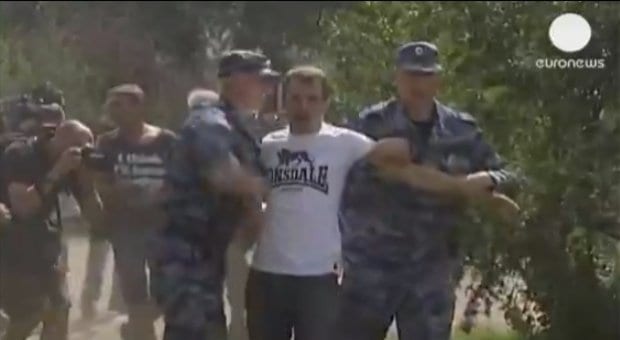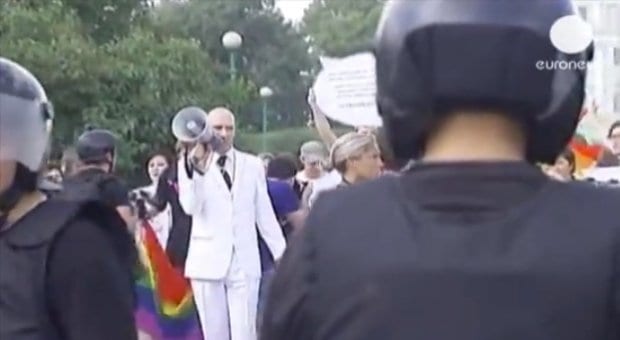
St Petersburg activists are attacked by nationalists and arrested by police. Credit: Screen shot from Euro News video report
Russian president Vladimir Putin has signed a nationwide anti-gay gag bill into law as a growing number of queer rights activists, including Nikolai Alexeyev, are calling for a boycott of both the 2014 Winter Olympics in Sochi and the 2018 World Cup, which Russia is set to host.
The Washington Blade reports that the law’s enactment follows what authorities described as anti-gay attacks that left two men dead in Volgograd and on the Kamchatka Peninsula in Russia’s Far East.
Today, Pink News reported the arrest of four gay rights activists who staged an unsanctioned rally in Moscow to protest the measure, while in St Petersburg, about 40 activists were arrested over the weekend as they attempted to hold a gay-pride rally. The report says more than 200 persons, described as nationalists, attacked participants with rocks and eggs and chanted “Sodomy will not pass.”
As the federal anti-gay bill was steadily making its way through the parliamentary process and on to Putin’s desk, concerns were being raised about what queer athletes and fans can expect when Russia hosts the Olympics and the World Cup.
The law characterizes propaganda of “non-traditional sexual relations” as “spreading the information in order to form non-traditional sexual desires in children, describing such relations as attractive, promoting the distorted understanding of social equality of traditional and non-traditional relations and also unwanted solicitation of information that could provoke interest to such relations.”
The scale of punishment for those who violate the bill’s measures varies. Individuals can be fined up to 5,000 rubles ($125-156), legal entities up to one million rubles and suspension of their activities, and internet promotion up to 100,000 rubles ($1,550-3,100).
Foreigners found to have flouted the law face the prospect of 15 days in prison and deportation.
Last month, the Washington Blade quoted Alexeyev as saying that the events are a “very good opportunity to raise particular concerns.”
“One of the ways for many countries would be to boycott these international sporting events because they take place in a country which doesn’t respect basic human rights.”
There were at least 23 out athletes at London’s 2012 Summer Olympics, which also boasted a Pride House for queer athletes, fans and supporters to view and participate in Games-related events. Vancouver established the first Pride House when it hosted the Winter Games in 2010. Russian officials, backed by court rulings, early on rejected the idea of a Pride House for the Sochi Olympics next year.


 Why you can trust Xtra
Why you can trust Xtra


